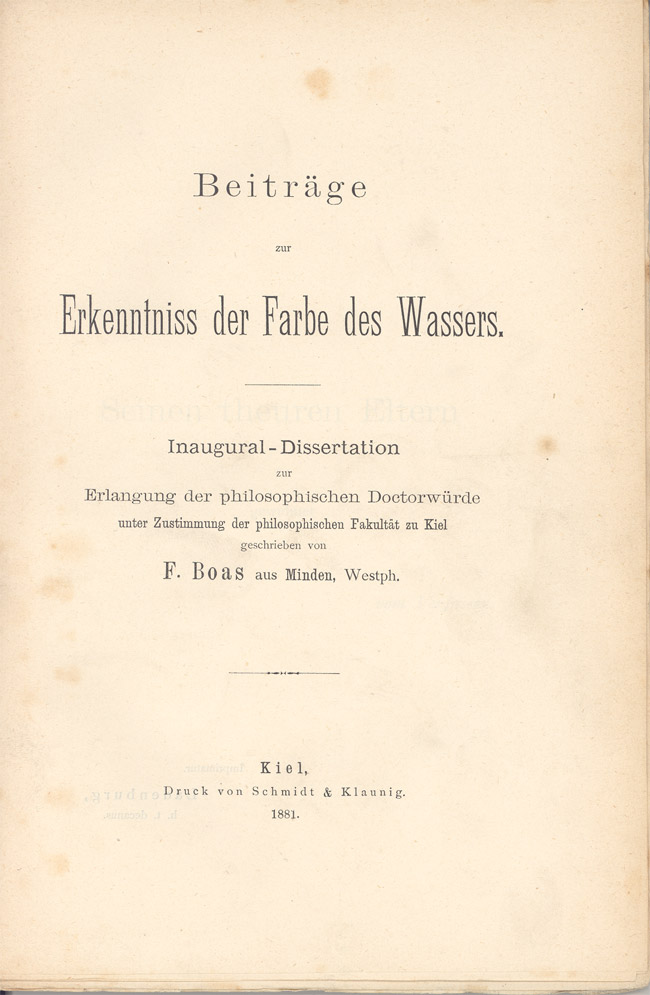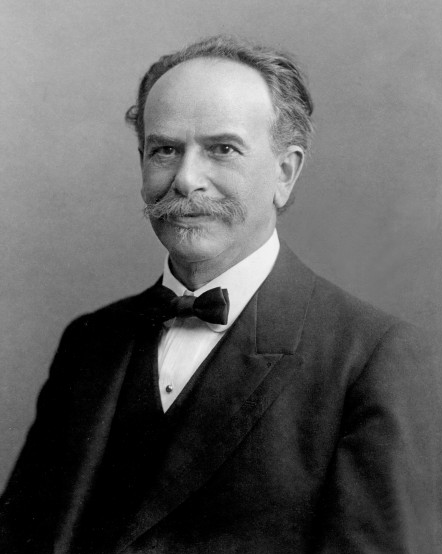|
Historical Particularism
Historical particularism (coined by Marvin Harris in 1968)Harris, Marvin: ''The Rise of Anthropological Theory: A History of Theories of Culture''. 1968. (Reissued 2001) New York: Thomas Y. Crowell Company is widely considered the first American anthropological school of thought. Closely associated with Franz Boas and the Boasian approach to anthropology, historical particularism rejected the cultural evolutionary model that had dominated anthropology until Boas. It argued that each society is a collective representation of its unique historical past. Boas rejected parallel evolutionism, the idea that all societies are on the same path and have reached their specific level of development the same way all other societies have. Instead, historical particularism showed that societies could reach the same level of cultural development Sociocultural evolution, sociocultural evolutionism or social evolution are theories of sociobiology and cultural evolution that describe how s ... [...More Info...] [...Related Items...] OR: [Wikipedia] [Google] [Baidu] |
Marvin Harris
Marvin Harris (August 18, 1927 – October 25, 2001) was an American anthropologist. He was born in Brooklyn, New York City. A prolific writer, he was highly influential in the development of cultural materialism and environmental determinism. In his work, he combined Karl Marx's emphasis on the forces of production with Thomas Malthus's insights on the impact of demographic factors on other parts of the sociocultural system. Labeling demographic and production factors as infrastructure, Harris posited these factors as key in determining a society's social structure and culture. After the publication of ''The Rise of Anthropological Theory'' in 1968, Harris helped focus the interest of anthropologists in cultural-ecological relationships for the rest of his career. Many of his publications gained wide circulation among lay readers. Over the course of his professional life, Harris drew both a loyal following and a considerable amount of criticism. He became a regular fixture a ... [...More Info...] [...Related Items...] OR: [Wikipedia] [Google] [Baidu] |
Anthropological
Anthropology is the scientific study of humanity, concerned with human behavior, human biology, cultures, societies, and linguistics, in both the present and past, including past human species. Social anthropology studies patterns of behavior, while cultural anthropology studies cultural meaning, including norms and values. A portmanteau term sociocultural anthropology is commonly used today. Linguistic anthropology studies how language influences social life. Biological or physical anthropology studies the biological development of humans. Archaeological anthropology, often termed as 'anthropology of the past', studies human activity through investigation of physical evidence. It is considered a branch of anthropology in North America and Asia, while in Europe archaeology is viewed as a discipline in its own right or grouped under other related disciplines, such as history and palaeontology. Etymology The abstract noun ''anthropology'' is first attested in reference to ... [...More Info...] [...Related Items...] OR: [Wikipedia] [Google] [Baidu] |
Franz Boas
Franz Uri Boas (July 9, 1858 – December 21, 1942) was a German-American anthropologist and a pioneer of modern anthropology who has been called the "Father of American Anthropology". His work is associated with the movements known as historical particularism and cultural relativism. Studying in Germany, Boas was awarded a doctorate in 1881 in physics while also studying geography. He then participated in a geographical expedition to northern Canada, where he became fascinated with the culture and language of the Baffin Island Inuit. He went on to do field work with the indigenous cultures and languages of the Pacific Northwest. In 1887 he emigrated to the United States, where he first worked as a museum curator at the Smithsonian, and in 1899 became a professor of anthropology at Columbia University, where he remained for the rest of his career. Through his students, many of whom went on to found anthropology departments and research programmes inspired by their mentor, Boas pr ... [...More Info...] [...Related Items...] OR: [Wikipedia] [Google] [Baidu] |
Boasian Anthropology
Boasian anthropology was a school within American anthropology founded by Franz Boas in the late 19th century. Overview Boasian anthropology was based on the four-field model of anthropology uniting the fields of cultural anthropology, linguistic anthropology, physical anthropology, and archeology under the umbrella of anthropology. It was based on an understanding of human cultures as malleable and perpetuated through social learning, and understood behavioral differences between peoples as largely separate from and unaffected by innate predispositions stemming from human biology—in this way it rejected the view that cultural differences were essentially biologically based. It also rejected ideas of cultural evolution which ranked societies and cultures according to their degree of "evolution", assuming a single evolutionary path along which cultures can be ranked hierarchically, rather Boas considered societies varying complexities to be the outcome of particular historical pro ... [...More Info...] [...Related Items...] OR: [Wikipedia] [Google] [Baidu] |
Classical Social Evolutionism
Unilineal evolution, also referred to as classical social evolution, is a 19th-century social theory about the evolution of societies and cultures. It was composed of many competing theories by various anthropologists and sociologists, who believed that Western culture is the contemporary pinnacle of social evolution. Different social status is aligned in a single line that moves from most primitive to most civilized. This theory is now generally considered obsolete in academic circles. Intellectual thought Theories of social and cultural evolution are common in modern European thought. Prior to the 18th century, Europeans predominantly believed that societies on Earth were in a state of decline. European society held up the world of antiquity as a standard to aspire to, and ancient Greece and ancient Rome produced levels of technical accomplishment which Europeans of the Middle Ages sought to emulate. At the same time, Christianity taught that people lived in a debased world fu ... [...More Info...] [...Related Items...] OR: [Wikipedia] [Google] [Baidu] |
Jstor
JSTOR (; short for ''Journal Storage'') is a digital library founded in 1995 in New York City. Originally containing digitized back issues of academic journals, it now encompasses books and other primary sources as well as current issues of journals in the humanities and social sciences. It provides full-text searches of almost 2,000 journals. , more than 8,000 institutions in more than 160 countries had access to JSTOR. Most access is by subscription but some of the site is public domain, and open access content is available free of charge. JSTOR's revenue was $86 million in 2015. History William G. Bowen, president of Princeton University from 1972 to 1988, founded JSTOR in 1994. JSTOR was originally conceived as a solution to one of the problems faced by libraries, especially research and university libraries, due to the increasing number of academic journals in existence. Most libraries found it prohibitively expensive in terms of cost and space to maintain a comprehen ... [...More Info...] [...Related Items...] OR: [Wikipedia] [Google] [Baidu] |
Cultural Development
Sociocultural evolution, sociocultural evolutionism or social evolution are theories of sociobiology and cultural evolution that describe how societies and culture change over time. Whereas sociocultural development traces processes that tend to increase the complexity of a society or culture, sociocultural evolution also considers process that can lead to decreases in complexity ( degeneration) or that can produce variation or proliferation without any seemingly significant changes in complexity (cladogenesis). Sociocultural evolution is "the process by which structural reorganization is affected through time, eventually producing a form or structure which is qualitatively different from the ancestral form". Most of the 19th-century and some 20th-century approaches to socioculture aimed to provide models for the evolution of humankind as a whole, arguing that different societies have reached different stages of social development. The most comprehensive attempt to develop a ge ... [...More Info...] [...Related Items...] OR: [Wikipedia] [Google] [Baidu] |
Antipositivist
In social science, antipositivism (also interpretivism, negativism or antinaturalism) is a theoretical stance that proposes that the social realm cannot be studied with the methods of investigation utilized within the natural sciences, and that investigation of the social realm requires a different epistemology. Fundamental to that antipositivist epistemology is the belief that the concepts and language that researchers use in their research shape their perceptions of the social world they are investigating and defining. Interpretivism (anti-positivism) developed among researchers dissatisfied with post-positivism, the theories of which they considered too general and ill-suited to reflect the nuance and variability found in human interaction. Because the values and beliefs of researchers cannot fully be removed from their inquiry, interpretivists believe research ''on'' human beings ''by'' human beings cannot yield objective results. Thus, rather than seeking an objective pers ... [...More Info...] [...Related Items...] OR: [Wikipedia] [Google] [Baidu] |



